- Summary
- Available by Request
- Patient Registration
- Appointments
- Content
- New Outreach Health Campaigns
- New PHR: Vanderbilt Assessment Scale - Parent Informant (Initial and Follow-Up) Modules
- New PHR: DAST modules (10, 20-Adult, 20-Adolescent)
- New PHR: Race/Ethnicity/Language (Detailed) Module
- New PHR: Pain Scale Only Modules
- New PHR: Pregnancy History/Status Modules
- New PHR: Menstrual History Modules
- New PHR: Infant Feeding Questionnaire Module
Summary
Don’t have time to read the entire 23.8 Release Notes? We understand—you’re busy! Use the table of contents on the left to easily jump to different sections, if needed.
Available by Request
Managed Services
Are you short-staffed or just need an extra hand? We can help.
Phreesia now offers Managed Services, a subscription-based offering that gives you access to trained patient support specialists to help manage your day-to-day responsibilities. Managed Services gives you a dedicated team to support whatever you need, including scheduling, outbound calling, insurance pre-work, collections monitoring and communications, referral management and data entry.
Managed Services is adaptable to your existing workflows and flexible to your specific needs, allowing you to scale up or down at any given time. That means you can reduce workflow strain, backfill productivity gaps and reallocate your star staff to more complex, high-value tasks.
Patient Registration
Mobile Self-Arrival for Scheduled Appointments
We’re excited to introduce Mobile Self-Arrival—a new solution that lets patients scan a QR code at their healthcare facility to complete a range of check-in tasks from their own mobile device when they arrive for their scheduled appointment.
In healthcare facilities with high patient volumes, long wait times and crowded waiting areas can negatively impact the patient experience. Mobile-Self Arrival helps you mitigate those challenges, enabling faster check-in and shorter wait times—all without staff intervention.

Same-Day Pre-Visit Enhancements – BETA
In this release, we’ve added a new setting that lets you automatically send a same-day Pre-Visit workflow to patients, even for clients leveraging Auto In-Office Mobile (AIOM).
For organizations that offer same-day appointments, we’ve heard that delivering an AIOM message shortly before the appointment does not always give patients enough time to complete online registration. In some cases, this has led to lower self-service utilization and more staff intervention for same-day visits.
This feature is designed to solve those challenges by delivering a Pre-Visit workflow to same-day patients shortly after the time of scheduling. That means you can increase self-service utilization, deliver a better patient experience and reduce the manual effort needed to drive Pre-Visit completion for same-day visits.
This will be available for enablement upon release for our BETA clients. If you are interested in learning more about this functionality or joining the BETA program, please reach out to your Phreesia representative.
Appointments
Appointments Hub V2 UI
We’ve gotten lots of valuable feedback about the V2 Appointments Hub user interface (UI) during the early access phase. With this release, we’ve made the V2 UI available for all organizations that use the Hub.
The new Appointments Hub UI offers several functionality enhancements, including:
- Improved organization settings so you can more easily see new requests and those that require action
- A validation workflow for requests scheduled outside the organization
- Reminders on requests to help you better manage outreach and follow-ups
- Improved Hub settings that allow admins to enable, disable and reorganize columns
In addition, we’ve added two additional subcategories under the “Scheduled” tab: “Validated” and “Validation Required.” This will be immediately available upon release. In an upcoming release, the legacy UI will be fully removed—but for now, you can choose to enable or disable the V2 UI in the top-right corner of the Appointments Hub.
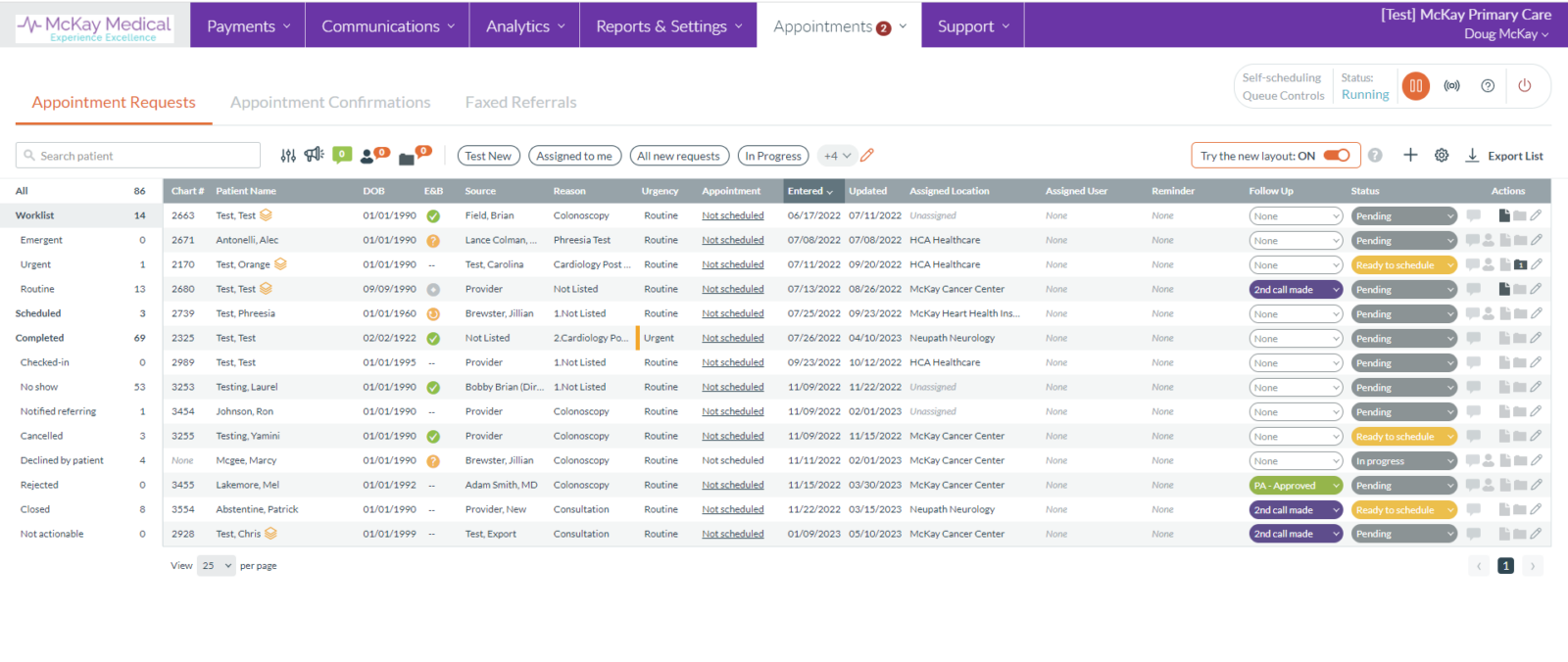
Provider Slot Setting for Self-Scheduling – Athena
In this release, we’ve added a new provider-level setting that allows you to hide or unhide generic appointment slots at the provider level, rather than globally.
This functionality is available to Athena organizations that use self-scheduling. It allows for more provider-level customization to help you better match appointment slots to providers’ schedules in Athena.
This will be immediately available upon release. Admin users can enable this feature via the “Provider Settings” page in the self-scheduling configuration.
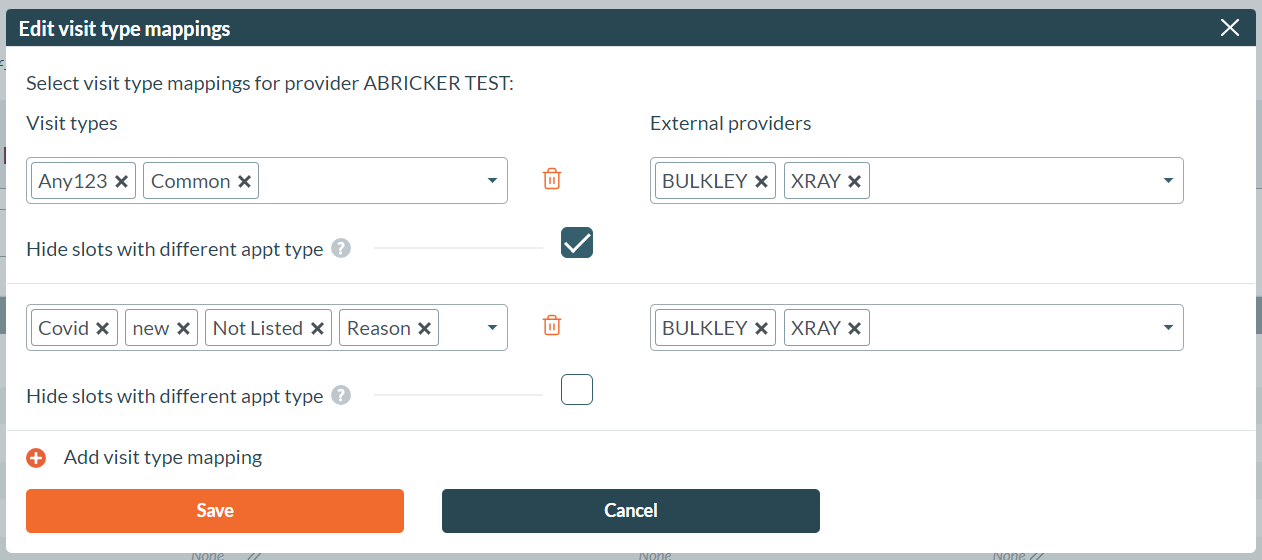
Content
New Outreach Health Campaigns
We’ve created a new outreach Health Campaign to educate patients on the newly approved RSV vaccine and who is eligible.
Template name:
- PHR: RSV vaccine
Additionally, for KCC/KCF clients, we’ve created two templates to help provider and third-party organizations collect a PAM survey outside of a patient visit.
Template names:
- PHR: Introduction to PAM + Initial PAM Survey (for third-party groups)
- PHR: Introduction to PAM + Initial PAM Survey (for providers)
For current Health Campaigns users, these templates are available in the Communication Customization section of the Dashboard and can be sent using the Patient Outreach Manager.
New PHR: Vanderbilt Assessment Scale – Parent Informant (Initial and Follow-Up) Modules
We now offer the Vanderbilt for practices to use to help diagnose ADHD in children ages 6-12 years old. We offer two versions: An initial questionnaire and a follow-up. The latest updates ensure formatting follows source documentation and presents clearly to patients.
We have also updated the print documents to display individual behavior totals and extensive screening results on the first page, removing the need for any additional calculations.
The Vanderbilt Assessment Scale is available in our global PRO suite. For additional details or enablement instructions, please reach out to your Phreesia representative.
New PHR: DAST modules (10, 20-Adult, 20-Adolescent)
We now offer the Drug Abuse Screening Test (DAST) for healthcare organizations to assess patients’ use of and dependence on drugs, impact on family/social life, dangerous behaviors, drug side effects and more. The latest updates ensure formatting follows source documentation and presents clearly to patients.
The DAST is available in our global PRO suite. For additional details or enablement instructions, please reach out to your Phreesia representative.
New PHR: Race/Ethnicity/Language (Detailed) Module
We now offer a dedicated interview that asks patients about their race, ethnicity and preferred language with detailed answer choice lists. This interview is founded on best practices and facilitates collection of crucial information that discretely integrates in the patient’s chart.
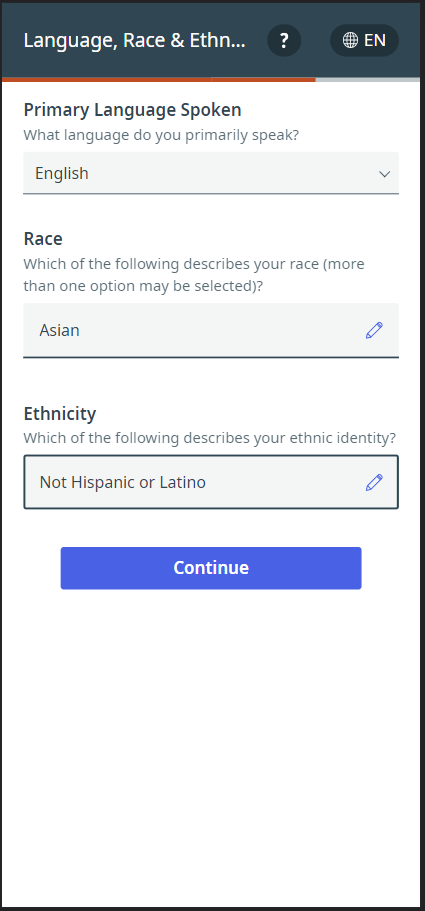
For additional details or enablement instructions, please reach out to your Phreesia representative.
New PHR: Pain Scale Only Modules
We’ve created standardized questions to collect patients’ self-reported pain levels. There are versions available for overall pain, arm, leg and back pain. Question types for number and sliding-scale selection are available depending on organization preference.
The information collected can help inform care plans and assess effectiveness of current treatments.
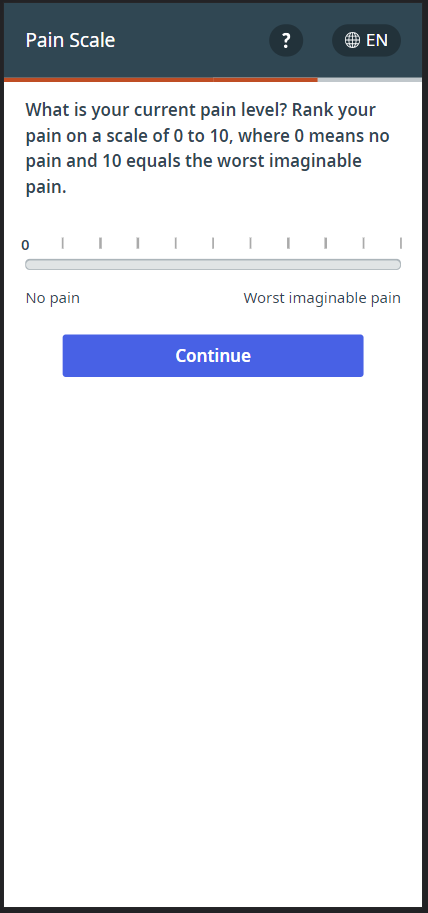
For additional details or enablement instructions, please reach out to your Phreesia representative.
New PHR: Pregnancy History/Status Modules
We’ve added a Pregnancy History question set that collects important childbearing history information—including current pregnancy status, gravida, term, preterm, abortions and living children (GTPAL) questions, birth information for each child born and more.
These modules are available in multiple versions based on client need (pregnancy status, GTPAL questions, and detailed pregnancy history). The questions are based on best practice clinical standards and optimized for patient comprehension.
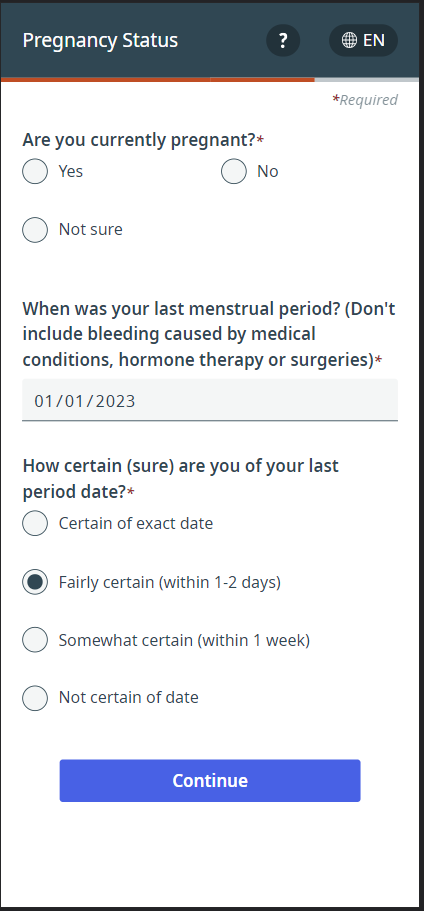
For additional details or enablement instructions, please reach out to your Phreesia representative.
New PHR: Menstrual History Modules
We’ve added a Menstrual History question set that collects important menstrual history information, including menstrual status, age at start, premenstrual symptoms, length and heaviness of flow and more.
These modules are available in multiple versions based on client need (short and detailed history, post-menopause and the full question set). The questions are based on best practice clinical standards and optimized for patient comprehension.
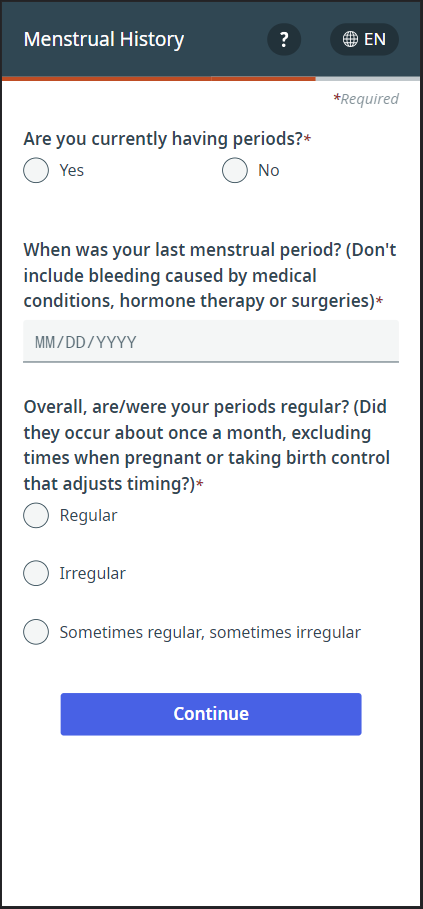
For additional details or enablement instructions, please reach out to your Phreesia representative.
New PHR: Infant Feeding Questionnaire Module
We’ve created an Infant Feeding Questionnaire designed to collect infant feeding information during every well-child visit in the early infant months. The questions help care teams understand the source of feeding, how often and the amount, as well as any vitamins/supplements being given.
The questionnaire can help track proper growth and nutrition, and it is intended for use in patients age 4 months and younger.
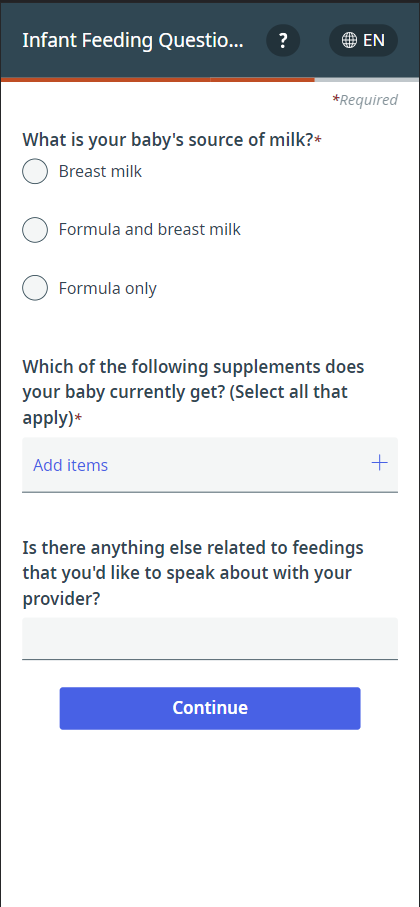
For additional details or enablement instructions, please reach out to your Phreesia representative.
